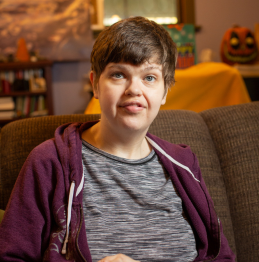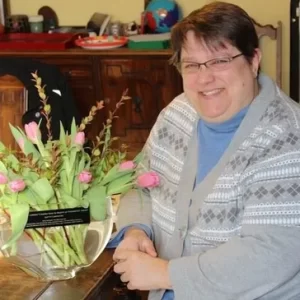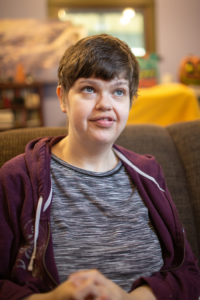
Siri has been a client of Lifeworks for over 15 years. Her mother, Jaette, first connected with Lifeworks when Siri graduated high school, hoping to find a space that offered a variety of activities, was centered on an inclusive philosophy, and could support Siri’s specific needs. After attending the day program in Brooklyn Park for over a decade, the onset of the COVID-19 pandemic forced the closure of our center. The sudden shift impacted Siri’s ability to engage in activities at Lifeworks, access her community, and overall well-being. Jaette and Siri crafted solutions that addressed the new challenges they faced through their partnership with Lifeworks.
Siri, 36, was born with a rare genetic neurological disorder called Rett Syndrome. Mostly occurring in women, Rett Syndrome affects nearly every aspect of life, including speech and motor skills. Accessing the community has been challenging for Siri, who needs assistance from her family or a care assistant. Siri can also get overwhelmed when out in the community or in social situations, so Jaette appreciated that Lifeworks could provide a more relaxed environment with sensory rooms, supportive staff, and music activities.
“Music has been very important to us,” says Jaette. “It’s been very important to Siri her whole life. Even when she was little, she could tell a minor from a major.” An essential aspect of music is its soothing effect for Siri. Jaette recognized the positive impact this had on Siri when she attended the day program. Jaette, who co-founded Hopewell Music Cooperative North, an organization dedicated to improving access to music education in North Minneapolis, contributed her musical knowledge as a volunteer at Lifeworks for many years.
 When the pandemic took hold in early 2020, Jaette and Siri had to change their lives significantly. Siri needed more support at home now that she wasn’t attending the day program, and opportunities for interaction with others were limited. Jaette noticed the impact this had on Siri, “Unfortunately, anxiety took hold, and the stairs were getting harder for her. At Lifeworks, she [had been] walking sometimes two or three times a day.”
When the pandemic took hold in early 2020, Jaette and Siri had to change their lives significantly. Siri needed more support at home now that she wasn’t attending the day program, and opportunities for interaction with others were limited. Jaette noticed the impact this had on Siri, “Unfortunately, anxiety took hold, and the stairs were getting harder for her. At Lifeworks, she [had been] walking sometimes two or three times a day.”
The increased care that Jaette and her husband, Randy, provided to Siri at home while navigating other changes brought on by the pandemic wore them down. Though many people have felt the return to “normalcy” after years of adapting to the pandemic, Jaette admits that restoring the life they had before is an ongoing challenge. “We’re trying to rebuild her life after that. I think COVID had even more of a devastating effect on the senior community and the disability community.”
We’re trying to rebuild her like after that. I think COVID had even more of a devastating effect on the senior community and the disability community.
The Brooklyn Park program eventually opened back up but shifted to a community-based model. With Siri often having anxiety about going places in the community, Jaette knew that they would need to find new ways to enrich Siri’s life. In 2022, they connected with the Lifeworks Navigation team to explore new possibilities. Dylan, the Lead Navigator they partner with, says, “When I got involved with Jaette and Siri, our goal was to move back in the direction of interacting with the community. COVID restrictions were coming down a little bit. We thought there was maybe more of a possibility.”
One of the first things Dylan helped them accomplish was switching from IHS and Respite to Consumer-directed community supports (CDCS). Switching from the traditional waiver options to CDCS gave Jaette and Siri more flexibility in directing their budget. “Some of those flexibilities were getting funds to work on the house,” says Dylan. Jaette took the opportunity to make their house more accessible for Siri. The family added a stair lift inside the house and an elevator on their back steps leading to the garage.
The latter made a notable impact on Siri’s ability to access outdoor spaces. It also allowed her to get into the family’s vehicle to start going to their favorite places in the community again. Jaette recalls how difficult the first winter of the pandemic was. “We had no way to get her out of the house,” says Jaette. “One step out the back door cut off the entire world to Siri before we got the elevator. I can hardly wait for winter now because she will go down this little two-step thing directly into the garage.”
Enrolling in CDCS also helped them cover the costs of services, like massage therapy, and enabled them to pay their staff more. One of the care staff who assists Siri has been with her since she was in grade school. Despite their longevity, Jaette says, “I had no way to give her raises, vacations, or to create an actual job for her.” Jaette feels good that she finally has a way to show her appreciation to the two caretakers that work with Siri. “These two women enabled Randy to keep working on his own business and enabled me to help build my nonprofit music school.”
Dylan’s knack for navigating the disability waiver system and self-directed services made him an essential partner for Jaette and Siri. “It’s just incredibly complex,” says Dylan of the system. “There’s a lot of administrative and technical skill needed. A lot of time is invested in making CDCS plans really work for people.” Maximizing benefits for Siri system still comes with challenges, even with an expert navigator like Dylan, as he shares, “We also have a lot of failures that we’ve run into together, [but] it’s nice to run into those failures with somebody else.”
We also have a lot of failures that we’ve run into together, [but] it’s nice to run into those failures with somebody else.
The decision to switch to CDCS greatly improved Siri’s quality of life. Earlier this year, the family received news of a new treatment that has the potential to address some symptoms of Rett Syndrome. The treatment has already improved Siri’s alertness, and she is beginning to use her hands to point to things instead of her eyes. Siri is also starting to speak again, something she has not done since high school.
Dylan regularly meets with Jaette and Siri to check in and provide his expertise. Together, they are finding new ways to enhance Siri’s well-being, like searching for solutions to bring health care into the home. Jaette and Dylan agree that the world is not designed to be fully inclusive of people with disabilities. Still, they are doing what they can to ensure Siri’s immediate world is more accessible. “In a perfect world, everything would be adapted,” says Jaette. For now, it makes a difference for Siri’s family to know they have someone on their side to advocate for their best interests.
